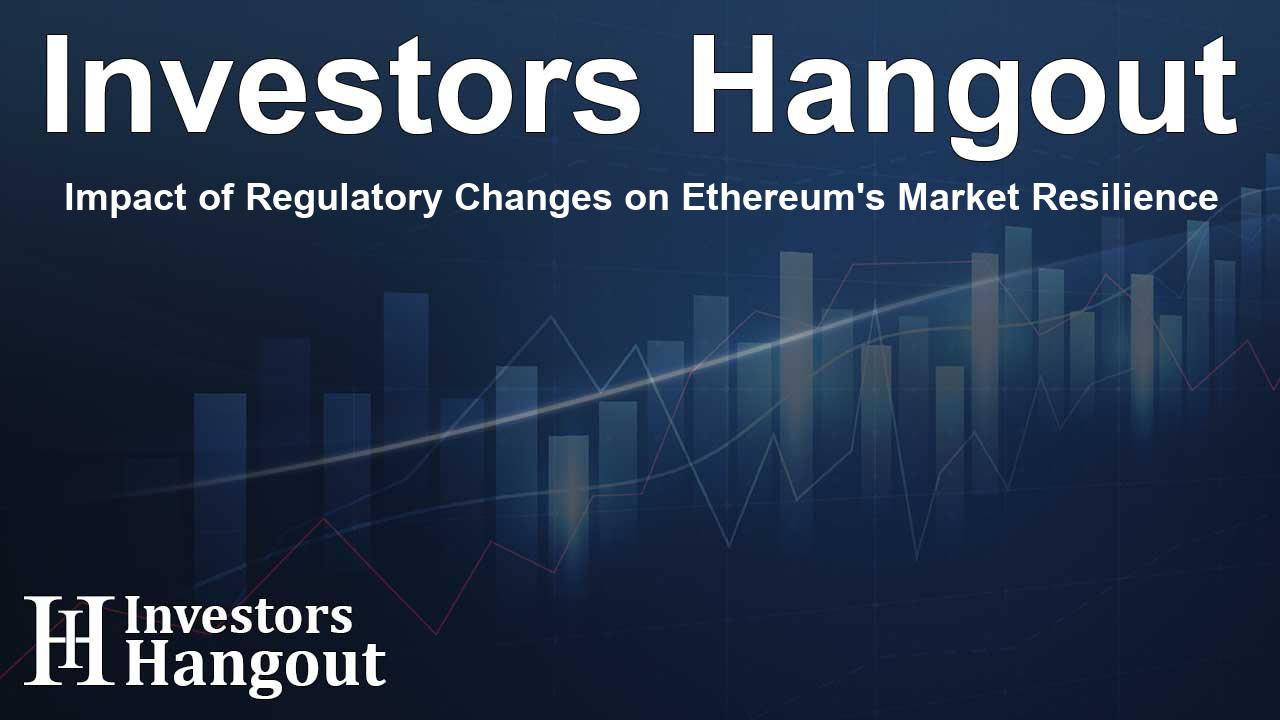Impact of Regulatory Changes on Ethereum's Market Resilience

Ethereum's Current Market Situation
Ethereum (CRYPTO: ETH) has recently seen a significant decline, trading at approximately $4,100 after a stark selloff following resistance at the $4,700 mark. This downturn has reignited concerns surrounding regulatory actions in the United States, especially those focusing on decentralized finance (DeFi).
Market Indicators and Trends
The price action suggests a looming retest of the $3,800 level, which is regarded as a crucial support point for traders. With Ethereum now trading below critical moving averages, immediate support is positioned at $4,100. This situation indicates a distinct bearish sentiment among investors, particularly as the price fluctuates around an ascending trendline connecting earlier support around $3,800.
If ETH fails to hold above $4,100, the likelihood of a deeper plunge toward $3,800 grows stronger. A stable recovery would require a decisive move back above the $4,350 mark, otherwise the bearish outlook remains firmly in place.
Bearish Sentiment and Indicators
Current technical indicators reflect a bearish momentum, particularly with the 4-hour RSI nearing the 27 mark, placing it deep within oversold territory. This signals that while price correction is possible, heavy selling pressure persists. A careful observation of Ethereum's price movements is essential, especially for those considering entering at this juncture.
Network Dynamics Amid Market Challenges
On-chain data indicates that investors are repositioning, with net outflows recently reported at around $235 million. Such moves typically suggest a trend of profit-taking rather than fresh accumulation, raising flags about the conviction level of long-term holders in this market.
Historically, spikes in sell-side activity have not instigated sustained upward price movements, further emphasizing the fragile state of investor sentiment. This alignment between outflow data and price action supports the prevailing bearish narrative as ETH battles to reclaim key support levels.
Potential Regulatory Ripple Effects on Ethereum
Recent proposals from lawmakers regarding a framework for decentralized finance may have profound implications for Ethereum, even if the network isn’t explicitly mentioned. As Ethereum is the backbone for much of DeFi lending, trading, and stablecoin transactions, it bears significant exposure to any changes in policy.
Implications of Proposed Frameworks
The proposed legislation would necessitate that individuals and teams providing access to DeFi protocols register as brokers with regulatory bodies such as the SEC or CFTC. This requirement could affect Ethereum developers managing popular protocols like Uniswap (CRYPTO: UNI) and Aave (CRYPTO: AAVE), potentially pushing them to relocate offshore for regulatory evasion.
Such a shift may limit U.S. users' access and drastically alter the operational landscape of DeFi, prompting discussions around the future of decentralized finance in light of regulatory scrutiny.
The Role of Stablecoins in Ethereum's Ecosystem
Stablecoins like USDT and USDC are critical to Ethereum's ecosystem, anchoring significant liquidity in the market. If new regulations hinder how these stablecoins interact with DeFi, demand could likely migrate toward other global markets or alternative blockchain technologies.
Institutional Interactions with Blockchain
As institutions like Goldman Sachs and Citigroup explore permissioned blockchain for internal settlements, the divergence between regulated environments and open decentralized networks becomes a focal point. Ethereum must navigate this transition carefully to maintain its position in the market.
Conclusion: The Future of Ethereum
Ethereum's battle at the $3,800 mark transcends mere technical analysis. It encapsulates a significant intersection of market structure and political dynamics. With its critical role in DeFi lending, stablecoin liquidity, and on-chain settlements, Ethereum's ability to retain this level amidst regulatory pressures is paramount. The ongoing political and market dialogue will likely dictate whether Ethereum continues to thrive as a leader in open finance or gives way to more controlled blockchain ecosystems.
Frequently Asked Questions
What are the main challenges facing Ethereum currently?
The primary challenges include bearish market trends, regulatory scrutiny surrounding DeFi, and increasing selling pressures from investors.
How does regulatory pressure impact Ethereum's price?
Regulatory pressure can lead to decreased investor confidence, resulting in sell-offs and price declines, as seen recently in Ethereum's trading.
What level is critical for Ethereum to hold?
The $3,800 level is considered critical as it serves as significant support whereby failure to hold could lead to further declines.
What could happen if proposed regulations are enforced?
Enforcing such regulations may restrict access for U.S. users and push developers to operate outside the U.S., potentially shifting Ethereum's influence in the DeFi space.
Why are stablecoins essential to Ethereum?
Stablecoins account for a considerable percentage of Ethereum's liquidity, making their interaction with DeFi protocols crucial for market stability.
About The Author
Contact Henry Turner privately here. Or send an email with ATTN: Henry Turner as the subject to contact@investorshangout.com.
About Investors Hangout
Investors Hangout is a leading online stock forum for financial discussion and learning, offering a wide range of free tools and resources. It draws in traders of all levels, who exchange market knowledge, investigate trading tactics, and keep an eye on industry developments in real time. Featuring financial articles, stock message boards, quotes, charts, company profiles, and live news updates. Through cooperative learning and a wealth of informational resources, it helps users from novices creating their first portfolios to experts honing their techniques. Join Investors Hangout today: https://investorshangout.com/
The content of this article is based on factual, publicly available information and does not represent legal, financial, or investment advice. Investors Hangout does not offer financial advice, and the author is not a licensed financial advisor. Consult a qualified advisor before making any financial or investment decisions based on this article. This article should not be considered advice to purchase, sell, or hold any securities or other investments. If any of the material provided here is inaccurate, please contact us for corrections.
